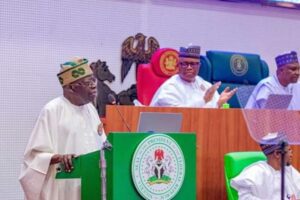ASUU calls for review of conditions in FG’s student loan program
The Academic Staff Union of Universities (ASUU) says poor and indigent students will not benefit from the students’ loan recently introduced by the Federal Government because of the conditions attached.
Chairman of the University of Jos Chapter of ASUU, Dr Mwolwus Jurbe, who said this in an interview with newsmen on Saturday in Jos, maintained that the conditions attached to the loan were not for the children of the poor, who were supposed to be the target beneficiaries.
Recall President Bola Tinubu had in June signed the Access to Higher Education Act, 2023, also known as the Students Loan Act.
The law would ensure the provision of interest-free education loans for Nigerians seeking tertiary education.
Some of the conditions are that; students who wish to apply for the interest-free loan must first obtain admission into a public Nigerian university, polytechnic, College of Education (COE), or Technical and Vocational Education and Training (TVET) School.
The applicant’s income or family income should not exceed N500,000 per annum, and he/she must provide a minimum of two civil servants as guarantors.
These guarantors should either be at least on Level 12 in the civil service or a lawyer with at least 10 years of post-call experience, a judicial officer, or a Justice of Peace.
Students, or their parents, who have previously defaulted on loans, or have been found guilty of exam malpractices, felony, or drug offences would not be considered eligible for the loan.
It further added that repayment of the loan would commence two years after the completion of the graduate’s National Youth Service Corps programme, and the money would be deducted directly from the beneficiary’s salary at a rate of 10 percent by the employer.
Self-employed beneficiaries would remit 10 percent of their total monthly profit to the designated Students Loan account to be prescribed by the bank.
According to Jurbe, however, ASUU, a union that promotes equity and justice for all, wants Nigerians to have equal opportunities at acquiring education, irrespective of social status.
“Part of the reasons for our last strike is the revitalisation of the university system, but we received backlash from Nigerians.
“We believe that the government can fund education; because federal and state governments spend huge amounts to send students abroad for studies.
“If this huge sum is harnessed into our education system, it will be the envy of many countries and foreign students will come here to study too.
“So, this loan will force parents to fund education, and it simply means that children of poor Nigerians can’t go to school,” he said.
According to Jurbe, any country that wants to make meaningful progress must fund its education sector.
The Chairman, who also decried the spate of unemployment in the country, said that most students who would access the loan might not be able to pay back within the stipulated time.
“Giving bursary awards to Nigerian students is better than the provision of loans. This is because students may not be able to pay back the loan due to inadequate employment opportunities in the country.
“The fact remains that many jobless graduates that obtain such loans while in the higher institution would definitely become indebted to the government and unable to repay in time.
“Such policies thrive in the western countries like the United States of America, simply because there are job opportunities awaiting students even before they graduate from their various schools.
“But that is not the case in Nigeria, and we will not support the commercialisation of education because it is a social good, and no one should be denied that on the basis of status,” he said.




